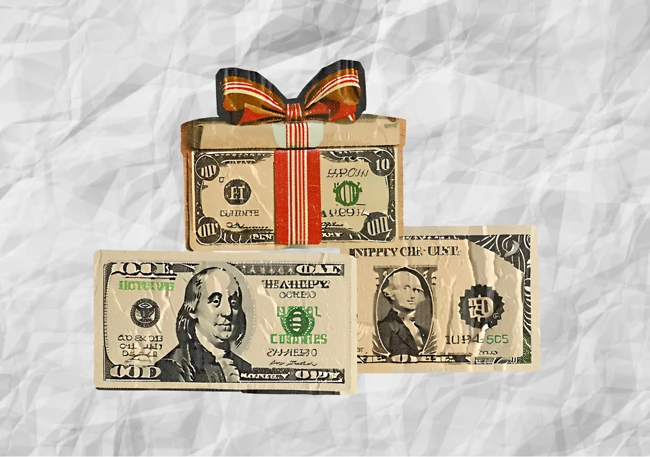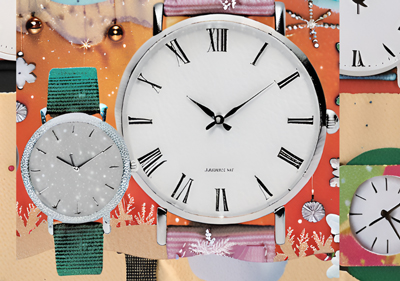Cash Gifts Etiquette: When To Give & When to Avoid
While giving cash or buying a cash card for someone may sound convenient, it’s not going to help your relationships. Let’s discuss the pitfalls of cash gifts.
Contents
- 1. Why We Give
- 2. The Downside of Giving Cash Gifts
- 3. When is it Acceptable to Give Cash Gifts
- 4. Summary
The popularity of cash gifts and gift cards has soared recently. The idea is to let the recipient decide what they want and buy it, courtesy of the giver. It makes sense, in theory. Figuring out what someone wants is difficult and can be stressful. You don’t want to disappoint. And people who tend to give unwanted gifts are more likely to give cash gifts. 1 But, as convenient as it may be, you shouldn’t rely on cash gifts to replace a traditional gift.
Giving and receiving gifts may seem like a transactional exchange, and it is in some sense, that’s not all it entails. Exchanging gifts, whether on holidays or celebrations, is a tradition that goes back as far as human civilization. From the potlatch to Scandinavian traditions, you will find references to gift giving customs in almost all cultures in history.
It’s an important tradition that helps build and maintain relationships. It comes with unwritten rules that we learn through social norms and passed down by parents to their children. Modernization and urban lifestyle has left people unsure what the rules may be. To understand when cash gifts are appropriate we first need to discuss why we give gifts to each other.
Why We Give
 When a gift is more than just a gift.
When a gift is more than just a gift. Sociologists & Anthropologists that have studied gift giving behavior generally tend to share a view that gifts symbolize and convey meaning.2 Essentially, gifts are signals.
Humans are social creatures, and to coexist with others we have to rely on signals that people give to understand their intentions and who they are. If you’re a grown up who’s not too naive you understand that most people are often not who they say they are and tend to hide their true intentions for their own benefit.
You may have heard the saying “Actions speak louder than words.” This is just an accurate observation about human nature. People often say things they don’t really mean and only their actions reflect on their true beliefs.
Actions are signals. When you catch someone in a big lie, their action to lie is a signal to you that they can’t be trusted.
When it comes to gifts as signals, you can get meaningful information about a person and their feelings for you based on what they chose for you.
One of the things you can tell about a person based on what they give you is how well they know of your interests and wants. 3 It’s a test of sorts. Only someone who knows you well enough to be called a friend will know of those things.
It’s similar to how having a college degree acts as a qualifier. It signals to others that you’re smart enough and hard working enough to get a college degree.
Research
A study on the role of gifts in romantic relationships concluded that for both men and women, using gifts to announce relationships is more likely to decrease the chances of a breakup. The researchers warn that gifts should only be used to make good relationships endure and not to turn a poor relationship into a successful one.4
A gift also signals how much time, effort and money you’ve put into picking it. This is because the more you care about someone and value your relationship with them, the more likely you are to invest those things into buying a gift to ensure the relationship is maintained.
Another important signal is selflessness. People often spend money on gifts that don’t provide much in terms of value to the recipient. There’s a wastefulness associated with spending money on gifts.
Research suggests that recipients tend to prefer gifts that are practical.5 So, have people been doing it wrong all this while? Turns out, no. There’s a reason gift stores are filled with things that aren’t of much use outside of being gifts. The inefficiency is on purpose. Such a gift signals the willingness to sacrifice money for the other person, since they know that they’ll get an equally inefficient gift in return. This proves that the exchange was a symbolic gesture rather than a way to get monetary gain.
This helps you root out the potential “gold diggers.” The recipient, by being glad to receive an inefficient gift, signals that they aren’t one.
The Downside of Giving Cash Gifts
 Cash gifts are inefficient signals.
Cash gifts are inefficient signals. Giving cash or gift cards is as efficient a gift can be. After all, the recipient can buy anything they want within the limit with your contribution.
The problem is that the cash gifts don’t signal much of anything except money invested. Recipients won’t be able to gauge your true feelings about them, or may even interpret it as a sign that you’re not that invested in the relationship. Alternatively, you won’t be able to gauge their feelings about you either.
They have significant disadvantages when compared to traditional gifts.6 Such as, they deprive the giver of opportunity to express his emotional appreciation of the recipient and the relationship. They’re not appropriate for every occasion and in all relationships. In comparison, despite sharing the major disadvantages of cash gifts, vouchers are more appropriate because they can be specifically targeted to the needs and desires of the recipient.
Note
Research suggests that gift vouchers are not redeemed by a significant portion of recipients and so go to waste. The only winner in these cases are those who sell them.
When is it Acceptable to Give Cash Gifts
I don’t recommend you swear off cash gifts just yet. There’s a place and time for them. As great as traditional gifts may be, at the end of the day, it’s simply not worth it to spend much time and effort on people you don’t have close relationships with.
If the giving is just an informal obligation and you don’t know much about the recipient, it’s OK to just give cash.
If someone specifically requests it or lets you know they prefer it then it’s acceptable to give cash gifts. Be careful if they are someone who has a close personal relationship with you though. It could be a red flag. People who aren’t willing to sacrifice money in this way are likely not going to be selfless in other aspects either.
Research
Gift cards vs cash: A study designed to provide insights into gift cards as gifts concluded that gift cards are more appropriate gifts than cash and recipients feel less guilt when paying for personal luxuries with gift cards than with cash.7
Also, if the recipient is someone who’s not financially independent and could use the money to buy something that they need, then giving cash or gift cards make sense. They’ll likely prefer it. This works if the recipient is younger, maybe a nephew or niece, etc, and they won’t feel obligated to match the amount.
Summary
Gifts are signals. They signal efforts you put into picking them, how much you know the person and your willingness to sacrifice to maintain the relationship. This can’t be achieved with cash gifts.
It’s appropriate to give cash & gift cards either when you don’t have a close relationship with your recipient or when they’re not financially independent and could use the money.
Frequently Asked Questions
Is it acceptable to give cash as a gift?
They’re generally not appropriate to give to people you have a close relationship with. They don’t allow you to express emotional appreciation for the recipient and tend to leave them with guilt when paying for personal luxuries. Read More
Is it better to give cash or gift cards?
When compared with giving cash, gift cards are better gifts since recipients tend to feel less guilt when paying for personal luxuries with them. Read More
What are the disadvantages of giving someone a cash gift?
Cash gifts don’t allow you to express your appreciation for the recipient and your relationship with them. Also, they’re not appropriate for every occasion and in all relationships Read More
Article Sources
1. Waldfogel, J., 2002. Gifts, cash, and stigma. Economic Inquiry, 40(3), pp.415-427.
2. Camerer, C., 1988. Gifts as economic signals and social symbols. American journal of Sociology, 94, pp.S180-S214.
3. Prendergast, C. and Stole, L., 2001. The non-monetary nature of gifts. European Economic Review, 45(10), pp.1793-1810.
4. Huang, M.H. and Yu, S., 2000. Gifts in a romantic relationship - A survival analysis. Journal of Consumer Psychology, 9(3), pp.179-188.
5. Galak, J., Givi, J. and Williams, E.F., 2016. Why certain gifts are great to give but not to get - A framework for understanding errors in gift giving. Current Directions in Psychological Science, 25(6), pp.380-385.
6. Stauss, B., 2023. Cash Gifts and Vouchers - When Are They Taboo and When Are They Welcome?. In Psychology of Gift-Giving (pp. 125-135). Berlin, Heidelberg - Springer Berlin Heidelberg.
7. Valentin, E.K. and Allred, A.T., 2012. Giving and getting gift cards. Journal of Consumer Marketing.

Dattaraj Pai
I’m the founder of Science of Gifts, a website dedicated to helping people find meaningful and thoughtful gifts. With years of experience researching the psychology of gift-giving, I explore how gifts communicate emotions, strengthen relationships, and create lasting memories.
Beyond writing about gifts, I have a background in storytelling and filmmaking, which fuels my passion for exploring the cultural impact of meaningful gestures.














